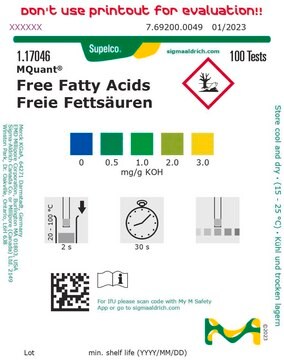MAK156
Fatty Acid Uptake Kit
sufficient for 100 fluorometric tests
Autenticatiper visualizzare i prezzi riservati alla tua organizzazione & contrattuali
About This Item
Prodotti consigliati
impiego
sufficient for 100 fluorometric tests
Metodo di rivelazione
fluorometric
Malattie correlate
endocrinological disorders, diabetes; gastrointestinal diseases; cancer
Temperatura di conservazione
−20°C
Categorie correlate
Descrizione generale
Fatty acids are critical for many biological processes including energy metabolism and the synthesis of structural cellular components. The facilitated uptake of fatty acids, presumably through fatty acid transport proteins, is thought to be regulated at multiple levels. The dysregulation of fatty acid uptake may contribute to diseases such as obesity, type 2 diabetes, and hepatic steatosis.
Compatibilità
This kit is suitable for the measurement of fatty acid uptake in cells containing fatty acid transporters
Principio
This kit is provides a simple and sensitive method for the measurement of fatty acid uptake in cells containing fatty acid transporters. This kit uses a proprietary dodecanoic acid fluorescent fatty acid substrate whose uptake into cells result in an increase in fluorescence intensity (λex = 485/λem = 515 nm).
Codice della classe di stoccaggio
10 - Combustible liquids
Certificati d'analisi (COA)
Cerca il Certificati d'analisi (COA) digitando il numero di lotto/batch corrispondente. I numeri di lotto o di batch sono stampati sull'etichetta dei prodotti dopo la parola ‘Lotto’ o ‘Batch’.
Possiedi già questo prodotto?
I documenti relativi ai prodotti acquistati recentemente sono disponibili nell’Archivio dei documenti.
Stephanie Kim et al.
Environmental health perspectives, 129(7), 77006-77006 (2021-07-30)
Chemicals in disparate structural classes activate specific subsets of the transcriptional programs of peroxisome proliferator-activated receptor-γ (PPARγ) to generate adipocytes with distinct phenotypes. Our objectives were to a) establish a novel classification method to predict PPARγ ligands and modifying chemicals;
Mona S Nilsen et al.
Diabetes, 69(9), 1903-1916 (2020-06-27)
Circulating branched-chain amino acids (BCAAs) associate with insulin resistance and type 2 diabetes. 3-Hydroxyisobutyrate (3-HIB) is a catabolic intermediate of the BCAA valine. In this study, we show that in a cohort of 4,942 men and women, circulating 3-HIB is
Rong Huang et al.
JCI insight, 4(18) (2019-09-20)
Age is a well-established risk factor for impaired bone fracture healing. Here, we identify a role for apolipoprotein E (ApoE) in age-associated impairment of bone fracture healing and osteoblast differentiation, and we investigate the mechanism by which ApoE alters these
Stephanie Kim et al.
Archives of toxicology, 94(9), 3087-3103 (2020-07-20)
Triphenyl phosphate (TPhP) is an environmental PPARγ ligand, and growing evidence suggests that it is a metabolic disruptor. We have shown previously that the structurally similar ligand, tributyltin, does not induce brite adipocyte gene expression. Here, using in vivo and
Xingzhe Ma et al.
Cell metabolism, 33(5), 1001-1012 (2021-03-11)
Understanding the mechanisms underlying how T cells become dysfunctional in a tumor microenvironment (TME) will greatly benefit cancer immunotherapy. We found that increased CD36 expression in tumor-infiltrating CD8+ T cells, which was induced by TME cholesterol, was associated with tumor progression and
Il team dei nostri ricercatori vanta grande esperienza in tutte le aree della ricerca quali Life Science, scienza dei materiali, sintesi chimica, cromatografia, discipline analitiche, ecc..
Contatta l'Assistenza Tecnica.




